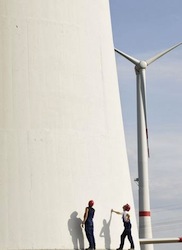The European Commission proposes putting an end to differentiated support for renewable technologies such as onshore and offshore wind in its consultation of draft State aid guidelines for energy and the environment published this week according to the European Wind Energy Association (EWEA). This would effectively stop Member States from determining their own energy mix – a fundamental principle of EU energy policy says EWEA.
 “These guidelines, if adopted in their present form, endanger Member States’ ability to meet their 2020 renewable energy targets cost effectively,” said Pierre Tardieu from the EWEA. “Moreover, following the destabilising regulatory changes for renewable energy in many countries, requiring further fundamental changes to support mechanisms would cause major investor uncertainty.” The organization has drafted its own brief related to the EU’s proposed guidelines.
“These guidelines, if adopted in their present form, endanger Member States’ ability to meet their 2020 renewable energy targets cost effectively,” said Pierre Tardieu from the EWEA. “Moreover, following the destabilising regulatory changes for renewable energy in many countries, requiring further fundamental changes to support mechanisms would cause major investor uncertainty.” The organization has drafted its own brief related to the EU’s proposed guidelines.
EWEA is calling for Member States and stakeholders to speak out to ensure the guidelines do not put at risk their path to the 2020 targets when they take part in the consultation on the proposal that has been launched. The guidelines are expected to enter into force on 1 July 2014.
Separately, the European Commission has announced investigations into the German renewable energy support mechanism, the EEG, and the UK’s measures offering generous support to nuclear energy.
“The EEG investigation risks undermining the wind industry in Germany by destabilising investors, and putting at risk the jobs, energy security and industrial leadership brought by wind and other renewables,” said Tardieu. “The Commission needs to carry out this investigation as rapidly and with as little disruption as possible.”
“The UK nuclear investigation is welcome, since the proposed 35-year subsidy would wreck efforts for a single European electricity market until after the year 2058 – over 100 years after the first commercial nuclear power plant was installed at Sellafield/Windscale in the UK,” Tardieu concluded.

